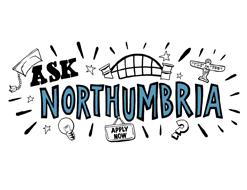-
Study
-
Clearing 2025
- Clearing FAQs
- Clearing VIP
- Clearing Case Studies
- Unlock Your Potential
- Search Clearing
-
Undergraduate
- UCAS Clearing & Confirmation 2025
- Application Guides
- UCAS Exhibitions
- Foundation Years
- School & College Outreach
- Information for Parents
-
Postgraduate
- Application Guide
- Postgraduate Research Degrees
- Flexible Learning
- Change Direction
- Register your Interest
-
-
International
International
Northumbria’s global footprint touches every continent across the world, through our global partnerships across 17 institutions in 10 countries, to our 277,000 strong alumni community and 150 recruitment partners – we prepare our students for the challenges of tomorrow. Discover more about how to join Northumbria’s global family or our partnerships.
View our Global Footprint-
Quick Links
- Course Search
- Undergraduate Study
- Postgraduate Study
- Information for Parents
- London Campus
- Northumbria Pathway
- Cost of Living
- Sign up for Information
-
International Students
- Information for Students
- International Events
- Application Guide
- Entry Requirements and Education Country Agents
- Global Offices
- English Requirements
- English Language Centre
- International student support
- Cost of Living
-
International Fees and Funding
- International Undergraduate Fees
- International Undergraduate Funding
- International Masters Fees
- International Masters Funding
- International Postgraduate Research Fees
- International Postgraduate Research Funding
-
International Partners
- Agent and Representatives Network
- Global Partnerships
- Global Community
-
International Mobility
- Information for Northumbria Students
- Information for Incoming Exchange Students
-
-
Business
Business
The world is changing faster than ever before. The future is there to be won by organisations who find ways to turn today's possibilities into tomorrows competitive edge. In a connected world, collaboration can be the key to success.
More on our Business Services -
Research
Research
Northumbria is a research-rich, business-focused, professional university with a global reputation for academic quality. We conduct ground-breaking research that is responsive to the science & technology, health & well being, economic and social and arts & cultural needs for the communities
Discover more about our Research-
Quick Links
- Research Peaks of Excellence
- Academic Departments
- Research Staff
- Postgraduate Research Studentships
- Research Events
-
Research at Northumbria
- Interdisciplinary Research Themes
- Research Impact
- REF
- Partners and Collaborators
-
Support for Researchers
- Research and Innovation Services Staff
- Researcher Development and Training
- Research Ethics and Integrity
- University Library - Open Access
- Vice Chancellors Fellows
-
Research Degrees
- Postgraduate Research Overview
- Doctoral Training Partnerships and Centres
- Academic Departments
-
Research Culture
- Research Culture
- Research Culture Action Plan
- Concordats and Commitments
-
-
About Us
-
About Northumbria
- Our Strategy
- Our Staff
- Place and Partnerships
- Leadership & Governance
- Academic Departments
- University Services
- History of Northumbria
- Contact us
- Online Shop
-
-
Alumni
Alumni
Northumbria University is renowned for the calibre of its business-ready graduates. Our alumni network has over 246,000 graduates based in 178 countries worldwide in a range of sectors, our alumni are making a real impact on the world.
Our Alumni - Work For Us
What will I learn on this module?
This module introduces students to the core skills and ideas of voice as applied to creative writing. You will learn about technical aspects of voice in creative writing, e.g. the concepts of register and free indirect discourse. You will also learn about the wider notion of developing an individual creative voice, i.e. the expression of subjectivity, and the importance of originality. You will learn about the way that tone is deployed in different types of writing, and you will learn about the imaginative use of language. All of this will give you tools that you can utilise in your own creative work.
How will I learn on this module?
Teaching is through one 1.5 hour session per week. The sessions will include tutor presentations and exercises, writing in class, and workshops where students offer peer feedback on work-in-progress.
The aim of this module is to create a supportive environment in which your knowledge, confidence, creative and critical skills in working on voice can develop. The module makes appropriate use of technology enhanced learning through use of the Blackboard electronic learning platform and the online support offered by Northumbria’s SkillsPlus programme.
In addition to the scheduled sessions, you are expected to undertake both directed and independent learning. Directed learning includes preparation for seminars (including both reading and written work) individually or in small groups. Independent learning includes further reading and investigation, the consolidation of seminar materials, and revision/preparation for the module assignments. There will also be one one-to-one tutorial per semester.
How will I be supported academically on this module?
Your learning will be academically supported by peer and tutor feedback on your work within writing workshops as well as tutor-led debates around different forms and modes of writing voice; your tutor will facilitate set writing exercises and help trigger new work and provide tutorial support.
The module handbook provides details of seminars, reading lists and assessment criteria; lecture PowerPoint slides are made available on the e-learning platform, together with links to relevant skills materials in the library. The module tutor is available in lectures and seminars, as well as during office hours, to discuss any queries or concerns you have. Feedback in workshops on formative work serves as ‘feed forward’, giving guidance on how to improve during the module.
You are advised to see your Guidance Tutor at least twice each semester to review your academic progress. The Guidance Booklet, which you receive at the start of your first year, includes structured materials designed to help you develop your self-reflection skills. These materials underpin the academic side of the regular Guidance meetings, helping you to learn how to best use the feedback you receive on your assignments, how to build on your strengths, and improve in the areas where you could perform better.
What will I be expected to read on this module?
All modules at Northumbria include a range of reading materials that students are expected to engage with. Online reading lists (provided after enrolment) give you access to your reading material for your modules. The Library works in partnership with your module tutors to ensure you have access to the material that you need.
What will I be expected to achieve?
Knowledge & Understanding:
• Develop an understanding of the nature of voice in different writing genres.
• Gain an appreciation of how different kinds of voice can be applied effectively.
Intellectual / Professional skills & abilities:
• Achieve a variety of basic key skills related to voice, e.g. register, free indirect style.
• Develop critical judgment and editing skills.
Personal Values Attributes (Global / Cultural awareness, Ethics, Curiosity) (PVA):
• Sensitivity and effectiveness when giving and receiving critical feedback in a group context.
How will I be assessed?
Formative: students will receive peer and tutor feedback on work-in-progress as part of seminars
Summative:
You will submit one assessment at the end of each semester
Assessment 1
A creative piece(s) totalling 1,700 words (or equivalent), accompanied by a 300-word reflective commentary. (50%) MLO 1, 2, 3, 4, 5
Assessment 2
A creative piece(s) totalling 1,700 words (or equivalent), accompanied by a 300-word reflective commentary. (50%) MLO 1, 2, 3, 4, 5
Feedback on summative work will be provided using the Departmental template and comments on the script.
Pre-requisite(s)
N/A
Co-requisite(s)
N/A
Module abstract
Please find details of this module in the other sections provided.
Course info
UCAS Code QW38
Credits 20
Level of Study Undergraduate
Mode of Study 3 years Full Time or 4 years with a placement (sandwich)/study abroad
Department Humanities
Location City Campus, Northumbria University
City Newcastle
Start September 2025 or September 2026
All information is accurate at the time of sharing.
Full time Courses are primarily delivered via on-campus face to face learning but could include elements of online learning. Most courses run as planned and as promoted on our website and via our marketing materials, but if there are any substantial changes (as determined by the Competition and Markets Authority) to a course or there is the potential that course may be withdrawn, we will notify all affected applicants as soon as possible with advice and guidance regarding their options. It is also important to be aware that optional modules listed on course pages may be subject to change depending on uptake numbers each year.
Contact time is subject to increase or decrease in line with possible restrictions imposed by the government or the University in the interest of maintaining the health and safety and wellbeing of students, staff, and visitors if this is deemed necessary in future.
Useful Links
Find out about our distinctive approach at
www.northumbria.ac.uk/exp
Admissions Terms and Conditions
northumbria.ac.uk/terms
Fees and Funding
northumbria.ac.uk/fees
Admissions Policy
northumbria.ac.uk/adpolicy
Admissions Complaints Policy
northumbria.ac.uk/complaints














